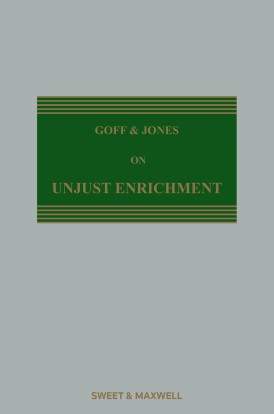Description
Goff & Jones is the leading work on the law of unjust enrichment. Successive editions have played a major role in establishing the central importance of the subject for private and commercial lawyers and developing its key concepts and principles. The text is comprehensive in coverage and written by highly respected scholars who explain all of the rules governing claims in unjust enrichment and discuss how these have been applied through a detailed examination of the case law. The book is frequently cited in courts throughout the Commonwealth and continues to signpost future developments in the field.
Key Features:
- Analyses and explains the theory, principles, and practical application of unjust enrichment
- Shows how the rules are applied by the courts through detailed discussion of case law
- Organized in accordance with the precepts established by senior appellate courts, examining in turn: when claims are barred because the defendant’s enrichment is justified by a legal ground; when a defendant is enriched; when the enrichment is acquired at a claimant’s expense; when the enrichment is unjust, what defenses may be available, and what remedies may be awarded
- Combines lucid explanation of theoretical concepts with practical advice about pleading, etc
- Heavily relied on by practitioners and frequently cited in court
- Written by a well-known and highly regarded team of subject experts
The new 10th Edition is completely up-to-date and contains a detailed discussion of important decisions since the last edition. Several chapters have been wholly or substantially rewritten to take account of significant new cases, and their impact on topics including the recovery of benefits from remote recipients, the recovery of benefits transferred on a condition that fails, the recovery of ultra vires payments by public bodies, the limitation rules governing claims in unjust enrichment and interest awards on such claims.
The 10th edition deals with the following six key matters in relation to making a claim:
- Explains how a claim in unjust enrichment can be precluded where a defendant’s enrichment is mandated by a statute, judgment, natural obligation, or contract
- Analyses the principles governing the identification and valuation of enrichment, and explains how these apply to claims for different types of benefit
- Considers the requirement that a defendant’s gain has been acquired at the claimant’s expense
TABLE OF CONTENTS:
Part 1 Introduction
- Chapter 1 Unjust Enrichment and Restitution
- Chapter 2 Justifying grounds: Statutes, Judgments and Natural Obligations
- Chapter 3 Justifying grounds: Contracts
- Chapter 4 Enrichment: General Principles
- Chapter 5 Enrichment: Types of Benefit
- Chapter 6 At the Claimant’s Expense: Personal Claims
- Chapter 7 At the Claimant’s Expense: Proprietary Claims
- Chapter 8 Lack of Consent and Want of Authority
- Chapter 9 Mistake
- Chapter 10 Duress
- Chapter 11 Undue influence and unconscionable bargains
- Chapter 12 Failure of Basis: General Principles
- Chapter 13 Failure of basis: Bases of transfer
- Chapter 14 Failure of basis: deposits
- Chapter 15 Frustrated contracts
- Chapter 16 Anticipated contracts that do not materialise
- Chapter 17 Free acceptance
- Chapter 18 Necessity
- Chapter 19 Secondary Liability: Overview
- Chapter 20 Secondary Liability: Contribution and Reimbursement
- Chapter 21 Secondary Liability: Insurer’s Subrogation rights
- Chapter 22 Money paid as taxes and Other Levies that are not Due
- Chapter 23 Ultra vires payments by public bodies
- Chapter 24 Legal incapacity
- Chapter 25 Illegality
- Chapter 26 Benefits conferred under judgments and orders that are later reversed
- Chapter 27 Change of position
- Chapter 28 Ministerial receipt
- Chapter 29 Bona fide purchase and good consideration
- Chapter 30 Estoppel
- Chapter 31 Counter-Restitution impossible
- Chapter 32 Passing on
- Chapter 33 Limitation
- Chapter 34 Legal incapacity
- Chapter 35 Illegality
- Chapter 36 Personal remedies and interest awards
- Chapter 37 Proprietary remedies: general principles
- Chapter 38 Proprietary remedies: trusts and liens
- Chapter 39 Proprietary remedies: subrogation to extinguished proprietary rights
- Chapter 40 Proprietary remedies: rescission and rectification


Reviews
There are no reviews yet.